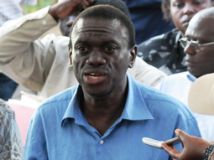Uganda’s election irregularities require judicial probe – HRW
Mar 3, 2006 (KAMPALA) — Reports of ballot stuffing, multiple voting, and potentially hundreds of thousands of people denied the right to vote in the Ugandan elections require urgent investigation, Human Rights Watch said today.
 Uganda’s Electoral Commission should publish the electoral results from each polling station to facilitate a meaningful review.
Uganda’s Electoral Commission should publish the electoral results from each polling station to facilitate a meaningful review.
The presidential and parliamentary elections on February 23 were Uganda’s first multiparty contest in 26 years. The incumbent President Yoweri Museveni, in power since 1986, retained his seat with more than 59 percent of the vote, according to the Electoral Commission. Museveni heads the ruling National Resistance Movement.
The main opposition party, Forum for Democratic Change, has rejected the election results, citing widespread irregularities and fraud. The party’s presidential candidate, Kizza Besigye, came in second to President Museveni with some 36 percent of the votes cast, according to the Electoral Commission.
On Tuesday, Besigye announced that the party would file a petition with Uganda’s Supreme Court. In addition to disenfranchised voters, there were discrepancies between the tallies from polling stations and voting districts, he claimed.
“Domestic and international observers have reported serious irregularities in the Ugandan election,” said Jemera Rone, East Africa coordinator for Human Rights Watch. “To ensure that the voices of Ugandans are heard, judicial review is both appropriate and necessary.”
The Electoral Commission has so far refused to publish presidential election results broken down by polling station. Instead, it has referred observers to the district level tallies in each of Uganda’s 69 districts, creating an impediment to full and proper public scrutiny of the results.
In a background briefing published one week before the vote, Human Rights Watch warned of threats to a free and fair election. The briefing documented the ruling party’s privileged access to state resources and media, the selective prosecution of opposition leaders, intimidation and violence against the opposition, and flaws in the Electoral Commission’s work.
On election day, violence was minimal. However, domestic and international observers noted major irregularities. Across the country, they observed that election officers denied possibly hundreds of thousands of registered voters the right to vote because they were allegedly not on the voter register. Other irregularities reported include voting by underage boys and girls, and the illegal turning away of voters from polling stations by presiding officers after 5 p.m. Under law, all voters in line by 5 p.m. had the right to vote.
The Democracy Monitoring Group, a Ugandan nongovernmental organization also known as the DEMGroup, deployed monitors to nearly all of the 19,786 polling stations across the country. In its preliminary statement after the elections, the group said that “more than 150,000 Ugandans were disenfranchised.” The group’s monitors documented incidents of rigging and bribery which, taken together, “rendered the exercise short of our expectation of a free and fair contest.” The DEMGroup, which is preparing a full report, warned that the full number of disenfranchised voters may reach 400,000.
Another Ugandan nongovernmental organization, the Foundation for Human Rights Initiatives, documented partisan electoral officials, Electoral Commission failure to update the register, and multiple voting, among other things.
The European Union, which deployed 200 observers, noted that substantial numbers of people were unable to vote even though they held voter cards. The head of the E.U. mission, Max van den Berg, called for an investigation by the Electoral Commission into the disenfranchisement to determine whether there were any “patterns of wrongdoing.” The E.U. mission sought a breakdown of the results by polling station, which the Electoral Commission did not make available, referring the E.U. observers instead to the individual 69 districts for those results.
The United States called for an investigation into irregularities and urged all parties to work together to address what it called “legitimate concerns” about the election.
“Given credible claims from observer groups and the opposition, there must be an impartial judicial process,” said Rone. “An independent assessment of the facts and a prompt analysis of the legality of the events are essential to maintain citizens’ faith in the electoral process.”
The government and military should pledge in advance to respect the decision of the courts, and not to interfere in proceedings.
Prior to the elections, as documented by Human Rights Watch and others, the military applied intense pressure on the judiciary to prevent Besigye from being released on bail when facing trial in civilian court, and it brought charges against him in the military court as well. Besigye was dropped as a defendant in that military case, although he still faces charges of treason and rape in two civilian courts.
(HRW/ST)
On the net:
– The Human Rights Watch briefing paper, “In Hope and Fear: Uganda’s Presidential and Parliamentary Polls,” is available at:
http://hrw.org/backgrounder/africa/uganda0206/
– Human Rights Watch Uganda photos are available at:
http://www.hrw.org/photos/2006/uganda/index.htm
– The DEMGroup Preliminary Report On Recent Presidential, Parliamentary Polls 2006 is available at:
http://allafrica.com/stories/200603010485.html
– For reports by the Electoral Commission, please visit:
– For reports by the Foundation for Human Rights Initiatives, please visit: http://www.fhri.or.ug/
